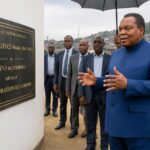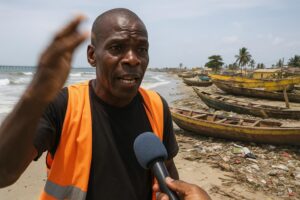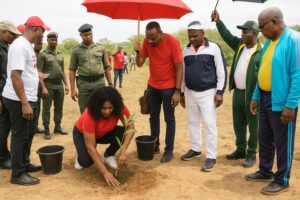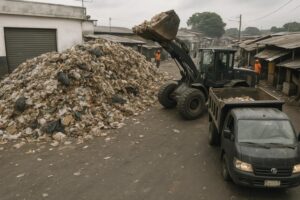Emergency sweep transforms Makélékélé
Shining orange bulldozers rumbled through Makélékélé at dawn, scooping month-old refuse while curious children filmed the scene on their phones. The surprise operation, launched by the Sanitation and Environmental Protection Unit of the Police’s Directorate of Finance and Equipment (DGFE), marks the boldest clean-up in Brazzaville this year.
For two weeks the unit, headed by Colonel-Major Michel Innocent Peya, has fanned out across the first and second municipal districts after repeated calls from residents. The move dovetails with City Hall campaigns and with President Denis Sassou Nguesso’s pledge to restore the capital’s historic nickname, “Brazza-la-verte.”
At the busy crossroads of Simon-Kimbangu Avenue and the Zanga dia ba ngombe drainage canal, mounds of rotting household waste once blocked traffic and attracted mosquitoes. Today the spot hosts improvised football matches on dust-free ground, a transformation one resident simply called “liberating” during a radio interview.
Similar scenes were recorded at Bacongo’s Total market, one of the largest retail hubs in the capital. Traders say sales of fresh produce have risen since foul smells disappeared. “Customers stay longer and mothers bring children again,” vegetable seller Mama Grâce told Les Dépêches de Brazzaville.
Heavy machinery answers grassroots calls
The DGFE dispatched ten tipper trucks, four loaders and thirty uniformed officers trained in environmental safety, according to internal figures shared with local press. Equipment normally reserved for logistical duties was reassigned after what officials describe as an “urgent sanitary concern” flagged by neighborhood committees.
Colonel-Major Peya insists the campaign is citizen-driven. “We acted because families asked us, not to replace municipal responsibilities,” he said during a brief stop in Ouenzé. His remarks, broadcast by Télé Congo, underline the cooperative tone adopted by the security forces since the start of the exercise.
Health priorities before the rains
Medical staff at Makélékélé district hospital report a seasonal spike in diarrheal disease every October when early storms flood clogged drains. By clearing waste now, authorities hope to reduce contamination of surface water and cut treatment costs for vulnerable households.
Dr Ange Louemba, a public-health lecturer at Marien Ngouabi University, calls the timing strategic. “Preventive sanitation is cheaper than emergency care,” he explained on Radio Congo, noting that vector-borne illnesses cost the city tens of millions of CFA francs annually.
Security forces embrace green mandate
Interior Minister Raymond Zéphirin Mboulou formally endorsed the operation, describing it as a practical contribution to the government’s national hygiene plan. His endorsement signals growing institutional support for putting police assets at the service of civil projects rather than solely security patrols.
Observers see the initiative as consistent with the president’s 2021–2026 social contract, which lists urban cleanliness alongside access to water and affordable transport. State daily La Nouvelle République argues the campaign could become a model for other provincial capitals if inter-agency coordination is maintained.
Mixed feelings toward private operators
Yet many residents remain doubtful after previous disappointments. The Turkish firm Albayrak, contracted in 2022 to replace Averda for waste collection, still struggles to meet its schedule, especially in peripheral zones. Piles often reappear within days, eroding public trust in outsourced solutions.
Shopkeeper Joël Mavoungou voices cautious optimism: “We applaud the police effort, but maintenance is the real test. If trucks stop coming, mosquitoes come back.” Municipal officers acknowledge the concern and say talks are ongoing to harmonise routes between city contractors and DGFE teams.
Keeping Brazza-la-verte alive
Urban planners stress that machinery alone cannot secure lasting cleanliness. The city produces roughly 1,000 tonnes of household waste daily, according to the Congolese Observatory of the Environment. Without community recycling points and stronger enforcement against illegal dumping, progress may stall.
Officials therefore pair clean-ups with awareness caravans. In Makélékélé, students from Nganga-Lingolo high school handed out leaflets detailing fines for littering and contact numbers to report overflowing bins. A short video clip of the scene, viewed 25,000 times on Facebook, illustrates the campaign’s youth appeal.
Funding also matters. The DGFE operation is financed through the police equipment budget, but Colonel-Major Peya hints at possible public-private partnerships for fuel and vehicle maintenance. City Hall, he adds, can then redirect savings to pave secondary roads threatened by erosion.
For now, residents enjoy the sight—and smell—of cleaner streets. Sunset joggers are back on the corniche, and photographers share before-and-after shots that trend under the hashtag #BrazzaClean. The challenge, as one elderly passer-by summed up, is to turn an emergency sweep into a daily habit.
Next steps include extending the programme northward to Talangaï and involving informal recyclers known locally as “bana poubelles,” who already collect plastics for resale. Integrating their network could boost employment while cutting landfill volumes, planners say, provided safety equipment and fair pricing are guaranteed.






















